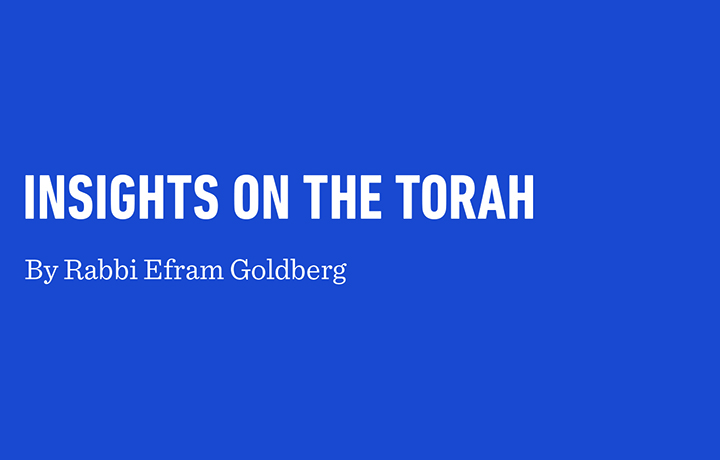Seeing The End From The Beginning
Bilaam, the famed prophet, was summoned to cast a supernatural curse upon our people in a desperate attempt to halt our march toward the promised land. No ordinary mystic, he was celebrated across the ancient world and had been enlisted by various kings and nations seeking a spiritual edge against their enemies.
The encounter atop the cliffs of Moab unfolded with stunning irony. A pagan prophet stood ready to curse the Jewish people, but Hashem delivered a piercing message: Prophecy is no tool for hire. It descends from Above, untouched by bribes or ambition. A donkey can speak while a prophet stands helplessly by. The beast sees the angel, but the seer sees nothing. Vision and prophecy belong to Hashem alone.
Despite Bilaam’s malevolent intentions, no curses would be spoken, no spells cast. Instead, Bilaam delivers soaring praise for our people, some of his words so stirring that they echo in our daily prayers. “How pleasant are thy tents, O Israel” are the poetic words that open our morning tefillah. “He sees no wrongdoing in Yaakov, nor toil in Israel” resounds in the Rosh Hashanah liturgy as a timeless affirmation of our worth.
Jewish history is laced with irony: the curses hurled at us to break us are transformed into timeless echoes of promise.
As he prepares to depart from his bitter and defeated hosts, Bilaam casts a final gaze toward the horizon of history. Having failed to curse a nation whose destiny is unshakable, Bilaam now peers into the future—into a time when the Jewish mission will reach its full crescendo. He envisions a Messianic era, when our chosenness will no longer be misunderstood as a privilege, but embraced as a purpose. In that world to come, humanity will recognize that our story was always meant to be their story—that we were chosen not to dominate, but to elevate.
Gazing toward the end of days, Bilaam proclaims that he knows the “wisdom of G-d.” From his vantage point at the edge of time, the tangled threads of history begin to take shape.
Bilaam was a prophet granted access to divine visions. Throughout history, though, many non-prophets have claimed to know “the wisdom of G-d.” Many have dangerously presumed to trace His hand along the winding course of human events.
There are aspects of divine wisdom we understand. We know Hashem’s words through His Torah and His will through the mitzvot He commanded. We feel His moral purpose in the spirit that flows through the Torah and His prophetic messages.
But discerning Hashem’s hand in history is an entirely different challenge. He acts through history in hidden and mysterious ways. His authorship is often concealed beneath layers of human behavior, natural forces, and political drama. Unlike Torah or mitzvot, history speaks quietly, in subtle signs rather than bold declarations.
Many try to read Hashem’s intentions into unfolding historical events. They detect divine purpose behind every twist of fate or national triumph or tragedy. Oftentimes, playing G-d by interpreting history is morally troubling. People sometimes assign blame for tragedies or suffering, pointing to particular decisions or communities as the cause. Even if those interpretations contain a grain of truth, they often compound the pain of those already in crisis. In moments of darkness, people seek compassion—not judgment. They need comfort, not condemnation.
Beyond moral insensitivity, such claims to know G-d’s historical authorship are theologically dangerous. No human fully grasps the logic of the Divine. Presuming to decipher His plan with certainty is not only arrogant, but irreverent. It turns faith into presumption.
However, there is a vital distinction between “playing G-d” and developing a religious awareness of history. It is one thing to claim knowledge of Hashem’s hidden motives; it is quite another to see His presence in the larger arc of history. History is shaped by Divine will. When great shifts occur—whether in the world at large or in the Jewish story, we are called to reflect on them. We do not try to explain every detail or claim to know Hashem’s exact plan, but we do look for the larger spiritual patterns that give these changes meaning.
To speculate on the specific causes or to identify individuals as Divine agents is presumptuous and irreverent. To view the larger movement of history not only through the lens of politics, but through the lens of prophecy, is an essential part of religious identity.
We are living through sweeping historical transformations—both in the immediate sense and across the broader arc of centuries. The past hundred years have witnessed political upheavals, the rise and fall of empires, and, most astonishingly, the rebirth and transformation of the Jewish world. In the past two years alone, we have seen transitions and convulsions that feel larger than life. Something is shifting.
Religious consciousness does not accept events as random, aimless, or unauthored. History is not a sequence of chance. We see a Guiding Hand behind the turbulence. These events feel charged with deeper meaning. They feel… messianic.
The term messianic itself stirs discomfort, and sometimes even fear. In the broader public imagination, Messianists are viewed as reckless idealists, willing to violate moral norms or embrace irrationality in pursuit of a utopian world order. Their fervor appears dangerous and destabilizing.
Regrettably, in Israel, religious Jews are sometimes scornfully labeled by the media as meshichi—the Hebrew word for “messianic,” a term that carries negative implications and undertones of fanaticism, detachment from reality, and religious extremism.
Even for religious Jews, the concept of messianism often provokes discomfort. For one, it can become a distraction from religious discipline. Judaism is deeply rooted in the here and now—in the responsibilities of the moment: tefillah, mitzvot, and moral conduct. Introducing sweeping visions of a different tomorrow can shift our mental and emotional focus away from concrete duty toward elusive fantasy.
Additionally, for many, messianism carries negative associations shaped by recent history. Perhaps no one did more to restore redemptive awareness than the Lubavitcher Rebbe. He powerfully revived Jewish anticipation for redemption and the coming of Moshiach, urging Jews to live with a sense of expectation and readiness for geulah. He labored to awaken a generation to the idea that yearning for redemption is not merely poetic—it is central to Jewish religious identity.
Toward the end of his life, uncertainty about succession and unfortunate statements by some followers sparked controversy. This turmoil clouded his larger message, making messianic belief seem extreme, irrational, or cultish. It overshadowed the Rebbe’s profound call to live with redemptive awareness, turning a core theological ideal into a source of tension and skepticism.
We do not play G-d, nor do we claim to know His motives or the hidden algorithms that govern history. Yet we live within the story He is writing, and we are expected to sense its divine trajectory—not in the fine details, but in the sweeping arc. Every Jew should view themselves as a Messianist.
History has a beginning and an end. It began when Hashem created the world and will conclude when all humanity recognizes His presence. The slow march toward that conclusion is called “redemption”—and the Jewish people are its driving force. As we live through moments that feel charged with messianic energy, we must not shy away from pondering how these events reflect prophecy and align with Hashem’s unfolding plan.
At the same time, our messianic imagination must be tempered. It should not lead to wild speculation, inflated hopes, or behavior that is reckless or irresponsible. Messianism is meant to inspire, not to destabilize.
Rabbi Moshe Taragin is a rabbi at the hesder Yeshivat Har Etzion/Gush, with YU ordination and an MA in English literature from CUNY. His books include the recent “To Be Holy but Human: Reflections Upon My Rebbe, HaRav Yehuda Amital” available at mtaraginbooks.com.













